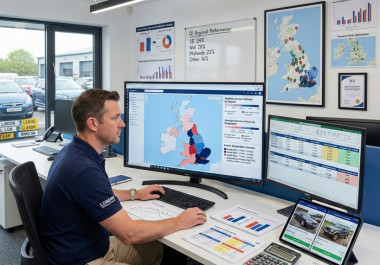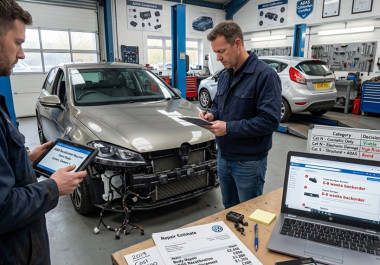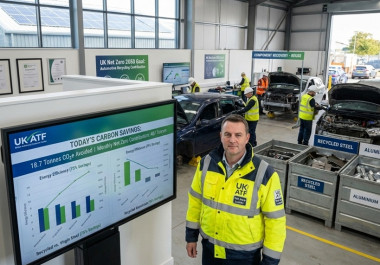In a corner of the auction yard, something different is going on. The standard cars suddenly look a little flimsy. This is where you find the hulking, no-nonsense shapes of 4x4s and trucks, often painted in functional shades of drab olive and desert sand. These are ex-military vehicles, and for a certain type of buyer, they are more appealing than any polished sports car. Owning one is about embracing rugged utility and taking home a real piece of service history.
There's a raw honesty to these machines. They are not just vehicles; they are tools engineered for the toughest conditions imaginable. Getting your hands on one, however, isn't like buying a normal used car. The process of bidding on military vehicles requires a different kind of preparation. It demands a sharp eye. A bit of patience. Get it right, and you can drive away with an incredibly capable machine with stories etched right into its steel.
The Unique Appeal of Surplus Stock
So, what is it about army surplus that gets people so interested? The fascination goes far beyond just collecting. You see businesses buying them to haul heavy equipment across muddy, difficult job sites. You see adventurous individuals who look at one and see a blank canvas for an off-road camper. The reasons for their appeal are simple and easy to understand.
-
Built to Last: These vehicles were designed to handle a punishing life. Their durability isn't just a feature; it is their entire reason for being. They were built to work, not to look pretty.
-
Solid Maintenance: Military fleets have strict service schedules that are not up for debate. Mechanics want them ready for action at all times, so crucial maintenance is rarely skipped. You get the benefit of that discipline.
-
A Distinctive Charm: An ex-military vehicle certainly commands attention. It has a presence and a sense of purpose that sets it apart. It just looks like it means business.
Of course, these strengths come with things to keep in mind. As sturdy as they are, some may have hidden scars from a hard life. It is vital to know exactly what you’re getting into before you even think about raising a bidding paddle.
Locating Your Target Vehicle
Dedicated MoD surplus auctions are the main source for direct military sales. That's where you'll find the most authentic stock. However, many fascinating vehicles enter the market through other channels. General vehicle auctions are excellent places to find rugged machines with military-grade DNA, even if they aren't a direct surplus. On platforms that specialise in used, salvage, and seized vehicles, you can often find heavy-duty vans, robust 4x4s, and commercial trucks that share that same tough DNA.
Mission Prep: Your Pre-Auction Briefing
If you want to succeed in this game, it all comes down to preparation. Before you step into the fast-paced auction environment, a little groundwork is essential to build your confidence.
-
Research Typical Models: Many types of utility vehicles exist. These can be iconic Land Rover Defenders, ex-service motorcycles, heavy-duty vans, or huge MAN trucks. The best way to get a feel for the market is to browse through the listings of all cars available for auction and see what's currently on offer.
-
Learn the Specifications: A service vehicle often differs from its civilian version. Its diesel engine might be tuned for more low-end pulling power. The suspension might be built to handle punishing loads. Knowing these key details is what gives you an edge.
-
Set a Realistic Budget: The final price is so much more than just the winning bid. You have to include costs like the buyer’s premium, the auction house's fee. You should also plan for any potential modifications, specialist insurance, and transport costs. Don't get caught out.
Demystifying the Paperwork
Ex-military vehicles can involve some unique documentation. Some might need extra proof that sensitive equipment has been properly decommissioned. Always, always confirm the details of the V5C logbook. This important document ensures the vehicle’s classification matches what you expect. If you are unsure about the process, most good auction houses provide guidance. You can also find help with signing up through a platform's Register Page.
The Pre-Purchase Inspection: What to Scrutinise
If an auction house allows for viewing before the sale, you absolutely must seize that chance. That first look can save you from a world of headaches later on. It's the point where you move from looking at pictures online to feeling the cold steel in person.
-
Engine and Undercarriage: Listen for any odd rattles or look for unhealthy-looking smoke from the engine. Then, get underneath the vehicle and check for rust. Pay close attention to structural points, as these machines often cross water.
-
Tyres and Wheels: Check all the tyres for perishing, cuts, and uneven wear. Mismatched, cheap, budget tyres are a big red flag. On a heavy-duty vehicle, check the wheels themselves for cracks or dents from hard off-road use.
-
Cabin and Controls: Feel the satisfying clank of the heavy door as it closes. Check if the essential gauges and controls are intact and working. See if there is any leftover kit that might need special handling. The interiors are basic, so focus on solid function, not comfort.
-
Bringing an Expert: Let's be frank. If you are not a mechanic, bring a friend or a pro. It's best to find someone who understands heavy-duty diesel engines or off-road gearboxes. Their expert eyes can spot red flags that an enthusiast's heart might overlook.
An Analogy: The Retired Working Dog
Think about it like this: buying an ex-military vehicle is a bit like adopting a retired working dog. It's incredibly capable, intensely loyal, and trained for a tough job. It is not a fluffy puppy from a pet shop, which is like a new showroom car. It has a history. It might have a few scars. It also won't have all the creature comforts. This type of dog needs a specific kind of owner. They need someone who understands its background and appreciates its raw strength, not someone who expects it to behave like a pampered lapdog.
A Tale from the Auction Floor
You hear some great stories in this trade. One that sticks out is about a young woman starting an outdoor adventure company. She came to a general auction looking for a standard 4x4, something to tow gear without any fuss. But tucked away in a corner was an old army Land Rover. It had no frills to speak of, just crank windows and tough vinyl seats that smelled faintly of canvas and diesel. She wasn't looking for it, but she was hooked by its sheer honesty. After a quick but careful inspection, she placed a cautious bid. To her delight, she won it for a surprisingly good price. That Land Rover, after a good service and a bit of tinkering, became the star of her fleet. It turned heads wherever it went and handled rough backroads with an unshakable confidence modern vehicles just can't replicate. For a similar range of rugged options, it’s always worth checking the Truck Auctions and Van Auctions to see what’s available.
Executing Your Bidding Strategy
Whether you attend in person or bid online, the strategy has similarities. Bids can escalate very quickly. The tension in the room can be very high. Because of this, it is vital to stay calm and stick to your budget. Some bidders jump in early to show they are serious. Others wait patiently until the final seconds to place a bid, hoping to catch others off guard. Both tactics can work, but good timing is key. If you are bidding online, always double-check that your bids register properly. A slow internet connection can cause you to miss out at the last second.
From Winning Bid to Your Driveway
Winning the bid is a fantastic feeling, but the process isn’t over yet. First, the auction house will require an immediate deposit. The rest of the balance is usually due shortly after. Remember to clarify any buyer’s premiums or extra fees with the auction staff. If anything is unclear, it's always best to ask. The Contact Page is the right place for any questions about payment or collection.
Transport is another key point. Some of these vehicles may not be road-legal in their current state. If so, they will require towing or a flatbed truck for collection. It is also wise to find specialist insurers who understand modified or ex-service vehicles.
Keeping Your Ex-Military Vehicle Mission-Ready
No matter how good it looks, an ex-military vehicle deserves a full check-up from a trusted mechanic. This should be done soon after you buy it. An oil change and a brake inspection are good starting points. This gives you a clean slate and true peace of mind.
Owners of these vehicles often belong to special clubs or online forums. These communities can be fantastic places to find spare parts and invaluable mechanical advice. For more general updates on the auction market, checking the News section is a great resource.
Ultimately, auctions for ex-military vehicles and other government surplus blend practicality, adventure, and a dash of history. They are not for everyone. However, they hold a special, rugged charm for those who value strength and uniqueness. By doing your homework and setting a realistic budget, you can turn a surplus machine into a loyal workhorse or a fascinating hobby project. It's all part of the experience offered at Raw2K.




